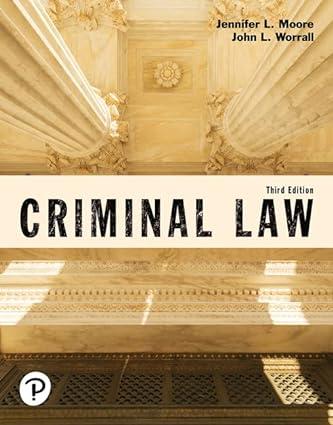The actus reus of trespassing is entering or remaining on another persons property without permission. The
Question:
• The actus reus of trespassing is entering or remaining on another person’s property without permission.
• The mens rea of trespassing varies by statute, but in states with general intent trespassing laws, mens rea is presumed so long as the trespasser is given notice that access is not authorized. “Notice” can include signs, fencing, and oral or written communication.
• Common law burglary required (1) breaking and entering
(2) of the dwelling of another (3) during the nighttime
(4) with intent to commit a felony inside.
• Modern-day burglary has relaxed the second, third, and fourth common law elements.
• The actus reus of burglary occurs via “breaking” (which can include opening a closed yet unlocked door) or surreptitious remaining.
• Burglary is a specific intent offense, meaning that the prosecution must prove intent to commit a crime (usually a felony) inside.
Questions:-
1. A trespassing prosecution may be a “fallback” to other alternatives. Explain how.
2. Should the crime of trespassing have a more specific mens rea requirement? Why or why not?
3. What is your opinion of the appellate court’s decision in the New Hampshire trespassing–illegal immigration case?
4. Compare and contrast burglary and trespassing.
Step by Step Answer:






